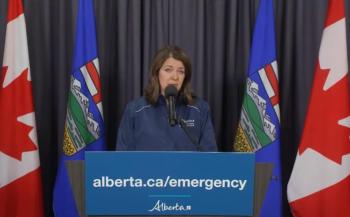Image Caption
Local Journalism Initiative Reporter
Windspeaker.com
Updated with more information from East Prairie settlement at 7:30 a.m. May 9.
Métis Settlement General Council President Dave Lamouche is on his way to East Prairie Métis Settlement to “see the devastation,” he told Windspeaker.com this afternoon.
The community was caught between two fires and evacuated late Friday. About 500 to 600 people made their way to High Prairie.
About 40 structures have been lost, said Lamouche, including about 27 homes, as well as sheds, farms and stuff like that.”
Some community members have remained behind to help with firefighting efforts, said Lamouche.
On Sunday, East Prairie Métis Settlement was joined by Gift Lake Métis Settlement in declaring local states of emergency.
Gift Lake Métis Settlement has not evacuated, said Lamouche, but the communities of Gift Lake and Whitefish Lake First Nation (Atikameg) have been without electricity and water since Friday.
Whitefish Lake First Nation declared a band council resolution state of emergency on Sunday.
Lamouche said Gift Lake was using some of its own resources to get generators as ATCO worked to repair electricity. However, he added, ATCO has sustained considerable infrastructure damage in the area.
In an announcement on its website Saturday, ATCO said it was monitoring the wildfires closely and “our crews will assess damage and begin restoration in areas that have been shut off.”
Peavine Métis Settlement had a fire burning north of it, but it seems to be moving away from the community, said Lamouche.
Lamouche said he has been in contact with Alberta Indigenous Relations Minister Rick Wilson, as well as directors in the department “working with Emergency Services Alberta to try and put some priorities in place.”
The three Métis settlements and 12 First Nations are among communities impacted by the 98 active fires (as of today) in central and northern Alberta. Twenty-seven of those fires are considered out of control, according to Christie Tucker, information unit manager for Alberta Wildfire.
Hectares burned have passed 390,000, said Tucker.
Impacted First Nations are Little Red River Cree Nation community of Fox Lake, O’Chiese First Nation, Sunchild First Nation, Whitefish Lake First Nation #459, Whitefish Lake First Nation #128 (Goodfish Reserve), Heart Lake First Nation, Swan River First Nation, Driftpile Cree Nation, Sturgeon Lake Cree Nation, Alexis Nakota Sioux Nation, Stoney Nakoda First Nation (Bighorn Reserve), and Beaver First Nation.
The Little Red River Cree Nation declared a band council resolution state of emergency on Sunday. Dozens of houses were lost to fire. Evacuation began on May 3, with a full evacuation in place on May 4 with about 3,700 people leaving.
In a statement issued Sunday, Indigenous Services Canada said it was “actively monitoring” the situation and managers were working with First Nations leadership, provincial emergency management agencies and other partners in Alberta “to be responsive to communities’ needs as situations evolve. ISC is ensuring that impacted Nations have the funding support on an expedited and streamlined basis.”
On Sunday, Alberta also declared a provincial state of emergency with close to 30,000 people having been evacuated from their communities. Today there are 15 evacuation orders still in place.
There were 14 other communities in Alberta to declare states of local emergency.
Premier Danielle Smith said this afternoon that one-time emergency financial assistance will be available to anyone who is out of their home for seven days. Adults will receive $1,250 and dependent children (under 18 years old) will receive $500. Smith confirmed the payment is also available to First Nations and Métis settlement members who have been evacuated.
Smith added that she spoke to Prime Minister Justin Trudeau, who has committed military support and other assistance from the federal government to help battle the fire.
In Saskatchewan, 14 active wildfires were affecting Clearwater Dene Nation, Saulteaux First Nation, Moosomin First Nation, Buffalo River Dene Nation.
ISC said it was also working with the Saskatchewan First Nations and other partners in that province.
Never miss a Windspeaker article. Subscribe Today to our new Windspeaker Newsletter!
Local Journalism Initiative Reporters are supported by a financial contribution made by the Government of Canada.

